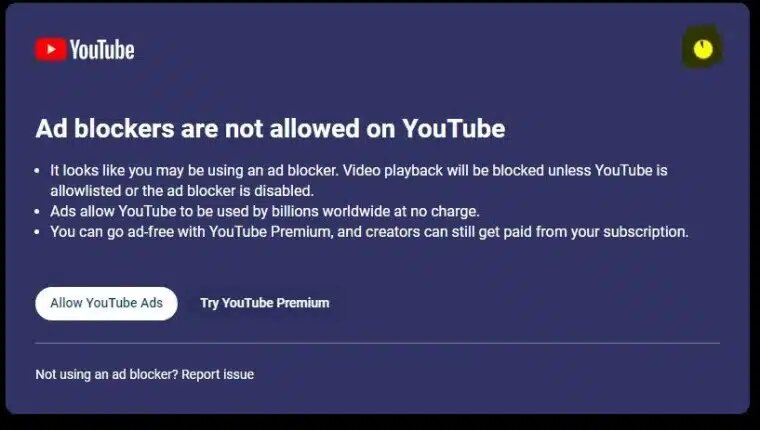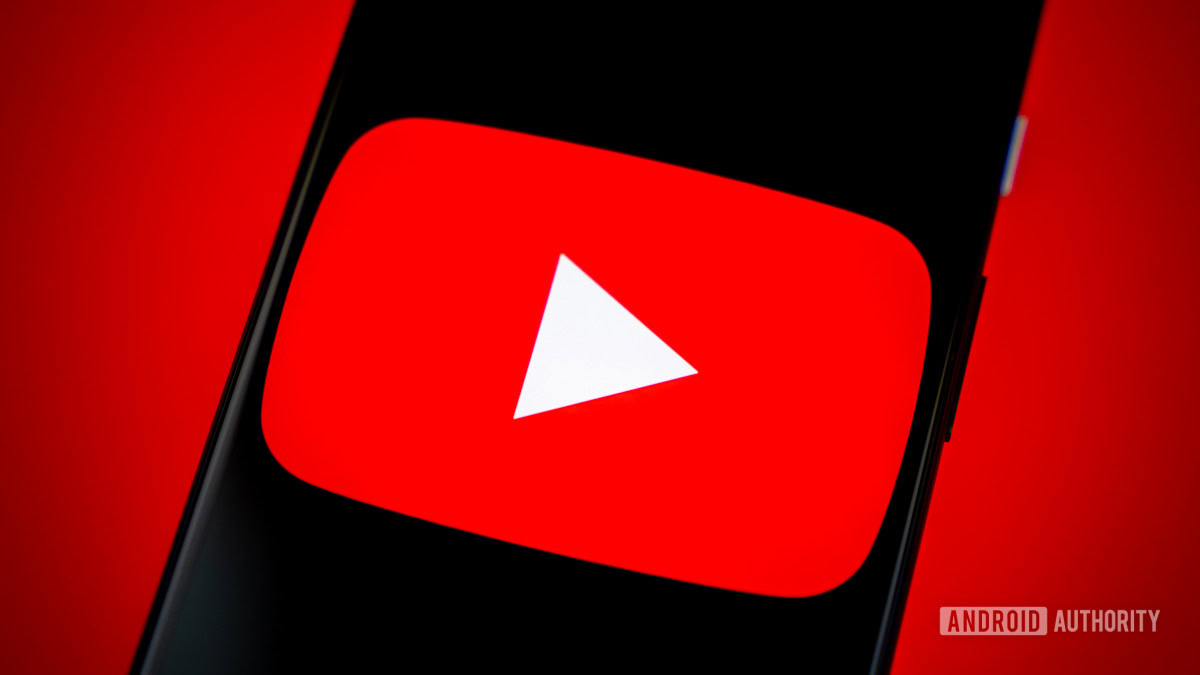Affiliate links on Android Authority may earn us a commission. Learn more.
YouTube and ad blockers: Who's in the right?
Published onMay 30, 2024
The latest installment of the YouTube against ad blockers saga has brought a new twist. Some users have noticed that accessing YouTube with certain ad blockers enabled causes their videos to be skipped or muted, making the streaming service all but unusable. The natural response of some is to claim that this is another attempt by YouTube’s owner, Google, to punish the use of these third-party apps and force them to either watch ads or pay for YouTube Premium instead. What’s different this time is that Google isn’t accepting the blame, so who should you believe?
Following our reporting on this issue after it was flagged by Reddit users, YouTube responded to our request for a statement on the matter. The spokesperson made clear that ad blockers were against the YouTube Terms of Service but went on to reference “an unrelated push to improve YouTube’s performance and reliability” as a reason why users might be experiencing issues. On its face, this is a denial from Google and YouTube that the problem is related to the measures against ad blockers.
We wondered if this is a credible claim. The question isn’t whether Google is targeting ad blockers but whether it is being entirely open about the extent of its tactics. Let’s look at both sides of the argument.
What’s the evidence that Google is doing this?
Reddit user SDHD4K shared a demonstration of what they suspected to be Google’s most recent ad blocker punishment. The video depicts the user attempting to play a video, both by clicking on a fixed point in the progress bar and by refreshing the page to start it from scratch. On each occasion, the video quickly jumps to the end.
The user claims that this is because they are using an ad blocker, and corroborating accounts of the issue are outlined in the replies to the post. Other people in the thread claim that accessing YouTube with an ad blocker causes the video to be automatically muted. If they use the volume slider to bring back the sound, it immediately mutes again once they move the cursor off the slider.
Since this problem only seems to afflict those using ad blockers, the natural suspicion would be that it is one of Google’s latest tactics to prevent the practice. The company doesn’t hide the fact that it wants to do so in general. It began tests of a three-strike system against the use of ad blockers as far back as June 2023, with the crackdown appearing to become much more widespread by October. Many YouTube users with an ad blocker enabled started to see a message warning that playback would be blocked after three videos if the user didn’t disable their ad blocker.
A more recent escalation from April of this year saw mobile users with ad blockers also targeted. Google announced in an official blog post that, “When we find an app that violates these terms, we will take appropriate action to protect our platform, creators, and viewers.” While some users came across an error message stating that the content wasn’t available, others faced buffering issues. These were attributed to the action that Google had advised it would take and had already been experienced by ad blocker users prior to the statement.
What was interesting about this stage of the Google fightback was that, if it was deliberately causing buffering issues to people using ad blockers, that bears key similarities to this latest accusation. Rather than an explicit warning or denial of service, these measures seek to seriously hamper the YouTube experience until the ad blocker is disabled.
Did Google deny it was behind the latest issue?
While we’re going down this rabbit hole, it’s worth taking a closer look at Google’s statement to Android Authority when asked for comment about this skipping and muting problem.
Ad blockers violate YouTube’s Terms of Service, and we’ve been urging users for some time to support their favorite creators and allow ads on YouTube or try YouTube Premium for an ad-free experience. An unrelated push to improve YouTube’s performance and reliability may be resulting in suboptimal viewing experiences for ad blocker users.
The statement begins by reasserting that YouTube doesn’t want you to use an ad blocker — this certainly isn’t in dispute. But the last part suggests that a performance update, “may be resulting in suboptimal viewing experiences for ad blocker users.” The inference here is that this ‘push’ might be responsible for this particular skipping and muting issue, but a skeptic might also conclude that this is deliberately vague. It could just as easily be a reference to the aforementioned buffering issues that have been occurring for months. That would certainly be more akin to a suboptimal viewing experience, which is something of an understatement if you’re talking about videos that skip to the end immediately.
Another striking thing is that whatever this performance and reliability push might be, it seems rather coincidental that it has only caused issues for people using ad blockers. Perhaps the update actually relates to the measures being taken against ad blockers. But in that case, why make it sound as if it’s a temporary inconvenience rather than confirming it was intended for that purpose?
In other words, there doesn’t appear to be an equivocal denial that these recent issues are a deliberate attempt to target ad blockers. Or perhaps we’re reading too much into it.
What’s the case for Google’s defense?

Far be it from me to stick up for a mega-corporation, but it’s only fair to consider that Google might be genuine in its suggestion that this latest problem isn’t a deliberate ploy.
As we’ve already seen, Google doesn’t hide the fact that it both discourages the use of ad blockers and is taking steps to prevent their use. The policy has been made clear in various statements over the past year, and when YouTube prevents you from using an ad blocker, the company tends to own it. When there were reports in November that the performance of YouTube with an ad blocker enabled can suffer depending on which browser you were using, a YouTube spokesperson gave us a statement not dissimilar to the one above. But, on that occasion, the statement made clear that it was the use of the ad blocker that was the issue and it was because YouTube wanted to discourage it.
We’ve also seen a similar situation in which Google has been vindicated in the past. When some YouTube users with ad blockers enabled were slowed down in January, many people were suspicious of Google. The company denied it was responsible and suggested it was the ad blocker software at fault. That might have been taken with a pinch of salt, but a subsequent statement from the technology group that owned the two ad blockers in question confirmed Google’s assertions and issued fixes to the problems.
Google has been vindicated in the past.
That example could also shed light on the nature of this problem. Muting issues aside, the fact that the user gets skipped to the end of the video is a very specific ‘error’ to occur. You might wonder if this is the ad blocker confusing the video with one of the ads and trying to jump past it.
This debate is also based on a few anecdotal examples from Reddit. We don’t know if many other people are affected by this issue, but we do know how internet virality works — an accusation of corporate oppression is made, outrage is generated, and everyone starts dunking on the service that we all regularly use.
The allegation itself raises further questions. If this is a deliberate Google scheme, why aren’t we seeing widespread reports of it? Since this problem is only related to users of the Adblock Plus app, why wouldn’t it apply to other ad blockers? Google is rarely accused of not being at the cutting edge of tech, so wouldn’t YouTube be better at applying this to more ad-blocking apps?
On that point, you have to consider why Google would confuse your experience at all. It has no qualms about displaying the ad blocker warning message to some users. Why not just make that the default measure to encourage you to disable your ad blocker? Some users wouldn’t realize that a performance issue is down to the fact their ad blocker is enabled, and it would be in Google’s interests to tell you how you can remedy that situation.
Where does that leave us?

You may have your own ideas, but there isn’t enough here for us to draw a definitive conclusion one way or the other.
As much as we might be frustrated by the number or length of ads before or during YouTube videos, Google has every right to attempt to stop you from blocking them. Most of its revenue is derived from ads, so blocking them is bad for business. You might not be keen on helping Google out this way, but some of that money does trickle down to the creator of the video that you’re trying to watch for free. There is also an alternative in YouTube Premium if you’d rather pay for your entertainment with your money rather than your time.
You might begrudgingly agree with all that but suggest that Google is being deceptive by appearing to deny it is causing this most recent issue. It would obviously be preferable for the company to be more open about it in those circumstances. Users would grumble about it, but at least they’d know where they stand.
Except we can’t really conclude that is the case. As outlined above, people have been a little too quick to point the finger of blame in the past, including us. It’s up to you whether you want to give Google the benefit of the doubt on this one or not.